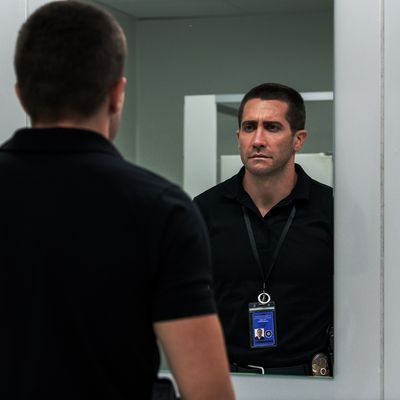
The pleasure of monitoring Netflix’s feature output month in and month out lies in the unexpected, the surprise in finding that the service has plopped a gem into the library without any fanfare. Such is the case in October, as a Peruvian master resurfaces for the first time in seven years with a strange, hypnotic psychodrama in only the loosest terms. Claudia Llosa’s in fine company among the rest of the offerings, too: a Turkish cop flick with a powerhouse lead performance, a handsomely photographed salute to Dutch valor during wartime, and an anime reworking one of Netflix’s all-time most-streamed titles. Take a break from your spooky season horror marathon to check in on the latest additions to the original movie catalog:
Essential Streaming
Fever Dream
Peruvian standout Claudia Llosa (once an Oscar nominee for The Milk of Sorrow) doesn’t do any hand-holding in her new psychodrama, a mesmerizing mix of inscrutable symbols and signifiers so confounding that the genre label could peel right off. Amanda (María Valverde) and her daughter Nina (Guillermina Sorribes Liotta) have come to an idyllic country house for the summer, and quickly fall in with neighbor Carola (Dolores Fonzi) and her unsettling son David (Emilio Vodanovich). Something’s not right with the kid, and after a “transmigration” of the soul meant to cleanse any bad vibes, he only gets creepier. Mystical, elemental wisps of the malevolent swirl around the lush getaway as the two adult women develop a fragile yet deep bond, growing close amidst a mounting feeling of unease articulated more through destabilizing formal juxtapositions and jarring transitions than dialogue. Literal-minded viewers take warning, but the associative looseness hums on a different — and potent — frequency.
Also Showing
Grudge
Yılmaz Erdoğan — actor, director, occasional poet, all-around pillar of the Turkish cinema — excels in this by-the-book cop thriller from Türkan Derya. With a gaze that could crumple steel and a mustache that would make Tom Selleck sick with envy, he brings lived-in grit to the role of chief inspector Harun, a man in the crosshairs. Kidnapped and attacked by his taxi driver, Harun kills the man in self-defense and flees the scene, only to discover the corpse hanging from a crane at his precinct the next day. From there, the plot spins itself into a tangle as further dangers befall Harun and the seeming conspiracy to undo him emerges from the shadows, climaxing in a multi-twist finale that takes an unexpected route to an inevitable outcome. Erdoğan plays each scene with measured pacing as he breaks down, his respectable exterior giving way to a desperate interior, which in turn gives way to a cowardice we’re proud to see him overcome.
There’s Someone Inside Your House
This slasher throwback of the I Know What You Did Last Summer variety isn’t trying to reinvent the wheel, mostly sticking with the tried-and-true “teens with dark secrets get picked off” formula, and yet it’s a functional model of the traditional wheel all the same. The killer’s gimmick is decently distinctive, as he dons photorealistic masks of his victims in each slaying to create the impression that they’re murdering themselves. The same can’t be said for his prey, archetypes with one trait apiece, though the pariah among losers Ollie benefits from honed acting courtesy of Théodore Pellerin. Director Patrick Brice and screenwriter Henry Gayden want to evoke the ‘90s in their as-if high-schooler witticisms, but unfortunately, their sense of what’s shocking is stuck there as well. The disappointing reveal clarifying the killer’s identity and why he’s terrorizing protagonist Makani (Sydney Park) has more in common with morally instructive after-school specials than horror.
My Brother, My Sister
A high degree of emotional nuance is required to overcome the inherent gooeyness of movies about estranged adult siblings bonding after years spent apart. (Case in point: You Can Count On Me, which only works due to the efforts of one of our greatest living writer-directors and actors to match his talents.) Many elements within this Italian family-reunion drama could have come from someone who’s studied humans, but never met one: the dated “hippie” persona of wayward brother Nikola (Alessandro Preziosi), the fun-police parenting of his sister Tesla (Claudia Pandolfi), their god-awful names, the wrongheaded portrayal of her son’s schizophrenia as something wondrous or supernatural. With writing so imprecise, it would take a miracle of acting to pull it off, and neither lead has the complexity to enrich the blunt-force sentimentality here. Those at peace with their own weakness for easy heartwarming may be unbothered, but the rest of us will be prone to eye-rolls.
The Guilty
In this single-location thriller remade from a 2018 smash in Denmark, Jake Gyllenhaal assays what must be every actor’s wildest fantasy and most terrifying nightmare: a feature-length one-man show, the ultimate talent showcase leaving a performance with nowhere to hide. Between the fidgety direction from Antoine Fuqua and the lumpy cop commentary from scriptwriter Nic Pizzolatto, it’s Gyllenhaal’s commanding, from-the-chest leading turn that carries a film often held back by its own inertia. He’s an LAPD officer manning the phones at dispatch following an incident we can predict long before its reveal in the final minutes, stumbling into an urgent case when he realizes he’s speaking with an abducted woman. (Or so it would seem!) As he talks her through her ordeal with language vague enough not to arouse her captor’s suspicions, he nimbly jumps around the call interface to get her the help she needs; Gyllenhaal excels in these scenes, moreso than the often awkward reckoning with his private pain in a pivotal scene taking place next to a puke-filled toilet.
Bright: Samurai Soul
It is not saying much that this anime spin-off from David Ayer’s 2017 fantasy-cop fusion is one hundred times better than the film that spawned it, but director Kyōhei Ishiguro more than clears the low bar set for him. His expansive palette of colors is a merciful reprieve from the muddy Los Angeles of the original, the setting moved to feudal Japan for another team-up between orc and human. The samurai Izo and the behemoth Raiden join forces to guard an elf named Sonya in possession of an all-important magic wand — a seemingly straightforward mission made needlessly convoluted by a constant exposition overloads going heavy on mythos that’s difficult to invest in. In the respect that gummed-up writing frequently forestalls the action we’re here to see, Ishiguro stays true to the spirit of Ayer’s work, but he takes far more pleasure in the kinetics of his face-offs.
The Forgotten Battle
The title of Matthijs van Heijningen Jr.’s stiff-lipped war picture foregrounds its clever trick of scope: The conflict in an obscure province of the Netherlands may have been one small, little-remembered corner of World War II, but to those caught up in the espionage operations taking place there, their urgency was life-or-death. The second-most-expensive production in the history of Dutch cinema shines a light on extraordinary acts of valor as the anti-collaborationist locals resist the Nazis setting up shop in Zeeland, with focus on intelligence trafficker Teutje (Susan Radder) and a trio of soldiers caught behind enemy lines. The trailer beats us to the Dunkirk comparison, though regionally specific detail and location shooting in thrall of the Netherlands’ natural majesty lend this film a merit all its own. A clear point of national pride, these events show the human spirit at its most triumphant, proving that quiet heroism cropped all over the globe when war demanded it.


